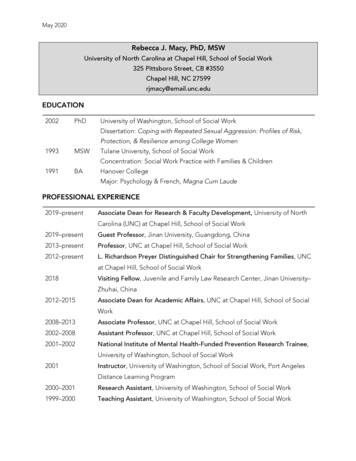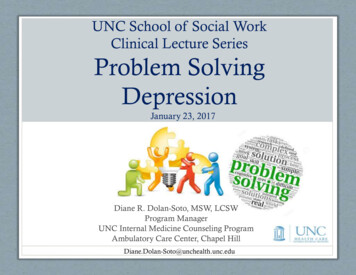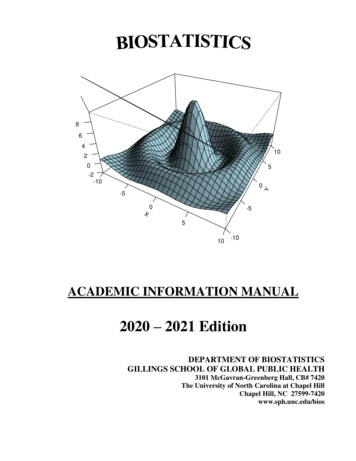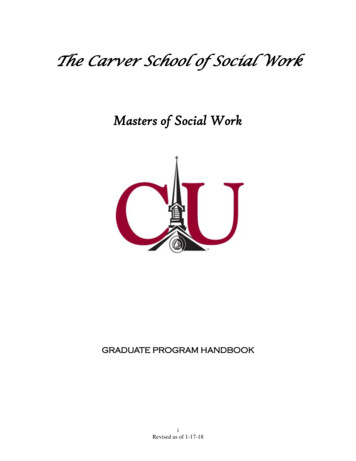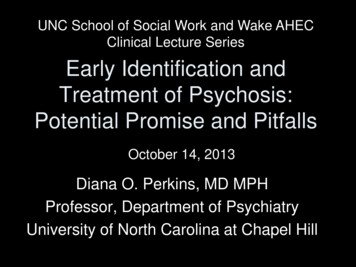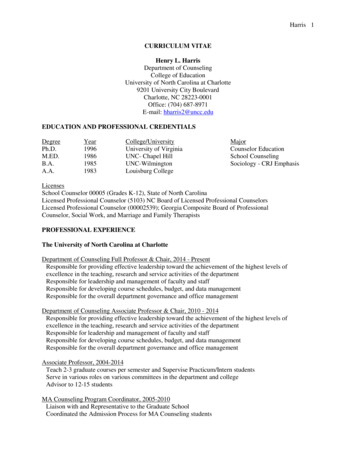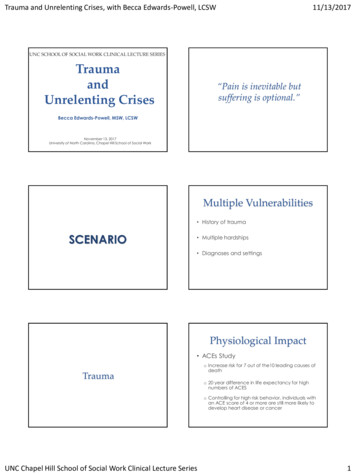
Transcription
Trauma and Unrelenting Crises, with Becca Edwards-Powell, LCSW11/13/2017UNC SCHOOL OF SOCIAL WORK CLINICAL LECTURE SERIESTraumaandUnrelenting Crises“Pain is inevitable butsuffering is optional.”Becca Edwards-Powell, MSW, LCSWNovember 13, 2017University of North Carolina, Chapel Hill School of Social WorkMultiple Vulnerabilities History of traumaSCENARIO Multiple hardships Diagnoses and settingsPhysiological Impact ACEs StudyTraumao Increase risk for 7 out of the10 leading causes ofdeatho 20 year difference in life expectancy for highnumbers of ACESo Controlling for high risk behavior, individuals withan ACE score of 4 or more are still more likely todevelop heart disease or cancerUNC Chapel Hill School of Social Work Clinical Lecture Series1
Trauma and Unrelenting Crises, with Becca Edwards-Powell, LCSWNeurological Impact Threats system activation Repeated exposure to threat alters braindevelopmento Problem is compounded by difficultydistinguishing between real and perceivedthreatsTrauma Related Beliefs Brain is hardwired to organize perceptionsand informationo Create a belief system or narrative Trauma can disrupt these belief systemso Avoidanceo Cognitive fusion Increased rates of high risk behaviorThemes in Session Avoidance11/13/2017Themes in Session Shameo Takes many formso Happens in and out of sessiono About how they behaved during the traumao About current responses, even decades later Relational difficulties Numbingo Trusto Disconnectiono Only feel “alive” when reliving the past Stucko Movement to healing is not a given, even withopportunityo AND some circumstances don’t allow for muchopportunity Susceptibility to extreme emotionso For some this is biological predispositiono Trauma related Vulnerability to further crisesActivity“How much of our professional training isgeared towards staying in control of terrifyingand confusing realities?- Bessel van der Kolk (2014)UNC Chapel Hill School of Social Work Clinical Lecture Series2
Trauma and Unrelenting Crises, with Becca Edwards-Powell, LCSWImpact on the Therapist11/13/2017Impact on Therapy Therapists behaviors towards client Cognitionsooooooo What are we telling ourselves about the client?About ourselves at therapists? Emotionso Hopelessness, helplessness, resentment, controlAvoidance Client perception of therapist responses Responseso How do these thoughts and feelings influencethe process?SolutionsMuch of human suffering is related to love andloss, and the job of a therapist is to helppeople acknowledge, experience, and bearthe reality of life.–ELVIN SEMRADWhat’s the Goal?AcceptanceCapacity through acceptance AND changeUNC Chapel Hill School of Social Work Clinical Lecture Series3
Trauma and Unrelenting Crises, with Becca Edwards-Powell, LCSW11/13/2017AcceptanceMath Problems?OrSunsets? Using Radical acceptanceo Of the client, yourself and the process Allowingo Of the world Identifying your own “shoulds” Teaching Radical AcceptanceAcceptance Validationo Communication that another person make senseand are understandable to youo Why?o How?Change What does this look like with theseclients?o ”You are in hell.” Functional validationLife Worth Living GoalsCognitive Change Observation of thoughts Interpretation of events and self Therapist styleooooUNC Chapel Hill School of Social Work Clinical Lecture SeriesUse of validation as much as modificationNon-verbalsBalancePositive reinforcement4
Trauma and Unrelenting Crises, with Becca Edwards-Powell, LCSWAffect Regulation Affect Regulation Tasks Purpose of emotions Natural vs. manufactured emotions11/13/2017Re-Connection To selfo mindfulness Relationships Community Higher PowerAssessments Ways of Coping ChecklistFor the Therapist Reasons for LivingFostering Connection Mindfulness practiceSecondary Trauma ABCs Creating and holding spaceoAwareness Assumption of positive intentoBalance Self-involving self-disclosureoConnectionUNC Chapel Hill School of Social Work Clinical Lecture Series5
Trauma and Unrelenting Crises, with Becca Edwards-Powell, LCSWCapacity11/13/2017”I don’t deserve them. “ Growing capacityo Ability to tolerateo Clinical skills Trainings, bookso Own support Therapy, peer support, supervision“And they don’t deserve me.”References Frankl, V. E. (1984). Man's search for meaning: Anintroduction to logotherapy. New York: Simon & Schuster. Koerner, K. (2012). Doing Dialectical Behavioral Therapy: APractical Guide. The Guilford Press, New York. Linehan, M. M. (1993). Skills Training Manual for TreatingBorderline Personality Disorder. The Guilford Press, New York. Resick, P. A., Monson, C. M., & Chard, K. M. (2016).Cognitive processing therapy for PTSD: A comprehensivemanual. New York, NY: Guilford Press. Stoddard, J. A., & Afari, N. (2014). The Big Book of ACTMetaphors: A Practitioner’s Guide to Experiential Exercisesand Metaphors in Acceptance and Commitment Therapy.Oakland, CA: New Harbinger Publications. Van der Kolk, B. A. (2014). The body keeps the score: Brain,mind, and body in the healing of trauma. New York: Viking. Wilson, K. G., & DuFrene, T. (2009). Mindfulness for Two: AnAcceptance and Commitment Therapy Approach toMindfulness in Psychotherapy. Oakland, CA: New Harbinger.UNC Chapel Hill School of Social Work Clinical Lecture Series6
UNC Chapel Hill School of Social Work Clinical Lecture Series 1 Trauma and Unrelenting Crises Becca Edwards-Powell, MSW, LCSW UNC SCHOOL OF SOCIAL WORK CLINICAL LECTURE SERIES November 13, 2017 University of North Carolina, Chapel Hill School of Social Work "Pain is inevitable but suffering is optional." SCENARIO Multiple Vulnerabilities


